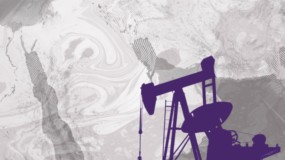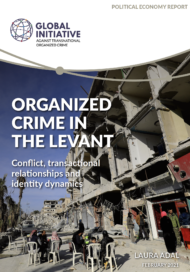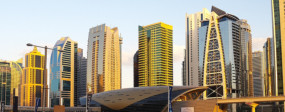Posted on 24 Feb 2023
As Lebanon’s energy shortage reaches unprecedented levels, criminal groups are profiting. Notably, Hezbollah is stepping in to bolster its image and expand its influence by evading Western sanctions and smuggling Iranian oil into the country. With over three-quarters of the Lebanese population living in poverty and national crime figures reaching an all-time high, Lebanon’s growing reliance on the black market to meet its energy needs paints a bleak picture of the country’s future.
Lebanon is facing what the World Bank has called one of the ‘top 10, possibly top 3’ most severe crises since the mid-19th century worldwide. The situation is driven by the country’s still-unfolding financial and economic collapse, the global pandemic and a prolonged political stalemate, worsened by the 2020 Beirut port explosions and the subsequent surge in public discontent. During the country’s compounding crises, oil and gas have become scarce commodities, triggering an illicit market for natural resources.
Allegations of corruption and conflicts of interest within Lebanon’s energy sector have been rampant, with reports of political elites being tied to secret multi-million-dollar agreements, widespread bribery and other questionable activities. These allegations have turned the energy industry into a point of national contestation, adding to the population’s growing discontent with the national authority in Beirut.
With little reason to count on their government to solve the issue, citizens have turned to the black market to meet their basic energy needs. A cartel of local businessmen known as the ‘generator mafia’ are exploiting the state’s supply gap by producing electricity through private generators, offering illicit fuel ‘subscriptions’ to citizens while reaping high profits.
But it is not just the private sector taking advantage of Lebanon’s energy crisis. In 2021, Hezbollah – a Shi’ite political party and militant group – declared in a controversial move that it would ‘solve Lebanon’s fuel crisis’ by illegally importing heavily sanctioned oil from Iran into the country, mainly via Syria.
An alternative source of oil
Hezbollah has positioned itself as an alternative to the government as the country’s primary fuel provider by illegally importing and distributing oil to recipients across the country. For organizations considered vital to communities, such as hospitals, orphanages and businesses, oil has been made available either for free or for prices significantly below Beirut-approved prices. Consequently, the illicit import and distribution of Iranian oil have been met with little resistance from the government – a show of Hezbollah’s grip over the country.
Hezbollah’s oil smuggling activities are primarily around the Beqaa valley in the country’s east – an area also referred to as ‘the barracks of Hezbollah’ – where the group is believed to control various oil depots. A largely mountainous region located along the border with Syria and far from Beirut’s reach, the valley has been under increasing Hezbollah rule since the 1980s. Over time, the Beqaa valley has evolved into a hotbed for a number of illicit flows, including cannabis, weapons, oil and other illicit commodities, with Hezbollah suspected to partially rely on these criminal revenue streams to fund its military and political activities, both domestically and abroad.
Not coincidentally Hezbollah enjoys in this area much popular legitimacy. Home to some of the country’s most marginalized communities, the valley’s illicit economies contribute significantly to people’s livelihoods. In these communities, the government’s shortcomings are felt more, leading them to turn to Hezbollah’s criminal governance structures for basic needs such as fuel, food and medicine, as well as education, employment and social welfare services.
A strategic move towards legitimacy
While the arrival of much-needed, yet illegal, fuel from Iran is not enough to solve Lebanon’s energy crisis, it represents a strategic move by Hezbollah to bolster its image and expand its influence. In what resembled a public relations campaign, the arrival of the first Iranian oil tankers into Lebanon in September 2021 was turned into a festive affair, with live broadcasting on Hezbollah-affiliated television stations, celebratory fire shots and a cheering audience.
Presenting itself as the good Samaritan in times of crisis is a strategy Hezbollah has repeatedly adopted. In the early stages of the COVID-19 pandemic, the group organized a national counter-strategy ahead of the government, including shipping medicine, setting up medical centres across the country and mobilizing 25 000 medical staff.
In what may be considered a recognition of its inability to solve Lebanon’s compounding crises, Beirut has seemingly taken a back seat while Hezbollah continues to smuggle oil into the country. This minimal pushback from authorities, coupled with local perceptions of legitimacy, continues to enable Hezbollah to take advantage of a wide variety of illicit activities.
Hezbollah’s petroleum politics amid Lebanon’s energy crisis exemplifies its dual role as an elected political party and an organized crime group. On the one hand, its actions may be considered another political strategy of providing Lebanese society with essential commodities to gain popular support. On the other, Hezbollah is exploiting the country’s vulnerabilities while reaping profits, used to finance what several states and the Arab League have classified as ‘terrorist activity’.
As Lebanon grapples with crisis after crisis, the country’s energy shortages and how Hezbollah has stepped in are emblematic of wider issues. As long as Beirut leaves a governance gap open for criminal groups such as Hezbollah to fill, the country will remain vulnerable to the erosion of the rule of law, the decline of social cohesion and instability – factors that weaken resilience to organized crime.
This analysis is part of the GI-TOC’s series of articles unpacking the role of oil in organized crime in Western Asia. The series explores, from a regional perspective, how oil smuggling is influenced by broader geopolitics, the effects it has on local dynamics throughout illicit supply chains and its wider global impact. Sign up to our Western Asia mailing list.



